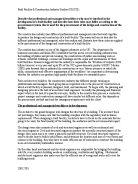I suggests, however, that blacks in some southern communities were more than intenerate phantom-like laborers. Using Charles Chesnutt’s, “The Goophered Grapevine” and “Po Sandy,” I submit that Chesnutt’s awareness of the link between black people and their plantation homes, not only subverts the structure of genealogical landscape but also reconstructs it.
Uncle Julius, in the larger society is in a class apart, merely because of race. Nevertheless, in his plantation community in central North Carolina, he is an insider, an insider with an interest in and an acute knowledge of the land. For instance, all of his “conversations” hinge on his relationship with the past landowners and on the knowledge of the landscape’s history. In fact, Julius takes pride in exclaiming, “Mars Dugal’ McAdoo—my ole marster . . . bought dis place long many years befo’ de wah . . .” He even recalls Mars Marrabo’s family tree and the various incidents that occurred in their homes. As an insider, Uncle Julius acculturates the northerners through his stories about plantation life. Strategically placing himself in the role of griot, he clearly weaves himself into the community fabric, implying, not blood kinship (though this is probable), but a kinship based on labor and loyalty—to the owners and to the land. By more than mere coincidence, he is not only the keeper of oral history (white and black), but also the link between the people (past and future owners) and the place. For without him, the already dwindling structure of genealogical landscape would dissolve.
Ironically, Uncle Julius creates the “ghostlike figures“ that “wander through the social landscape.” Yet, Julius’s ghost has a name and claims a place. Through conjuring, Po’ Sandy inhabits a tree because he does not want to leave his home and wife. Uncle Julius, in the guise of a trickster, relates the tale of Sandy’s transformation to the new owners in an attempt to deter them from tearing down the old schoolhouse, which further emphasizes Uncle Julius’s devotion to his “homeplace.” Also, his attempts to maintain control of the vineyard in “The Goophered Grapevine” suggest again that he feels entitled to the land and all of its structures and resources.
According to Allen, the house is “the focal point of the place . . . an evocative symbol of the human relationships—family ties—lived out in it” (159). Because African Americans before and immediately after the Civil War were denied the opportunity to own property and because the “big house” was not place of communion for the slaves, a focal point for them was any part of the landscape they could use, covertly or openly, to develop a sense of place. As shown, the vineyard, the tree, and the schoolhouse symbolize the connection between the “tenants” and the land, and the owners.
The genealogical landscape, then, that emerges from Chesnutt’s stories reveals the interwoven bonds between blacks and whites and their senses of place. Traditional property ownership and kinship ties are not prerequisites for claiming the land on which one lives and works. Uncle Julius, masking as griot and trickster, locates and claims for himself and for his plantation family the historical “place” that they deserve and in turn, subverts the structure of genealogical landscape.
Works Cited
Allen, Barabara.” “Genealogical Landscape and the Southern Sense of Place.” Sense of Place:
American Regional Cultures. Barabara Allen and Thomas J. Schlereth. Eds. Lexington: UP of Kentucky, 1990. 152-163.







